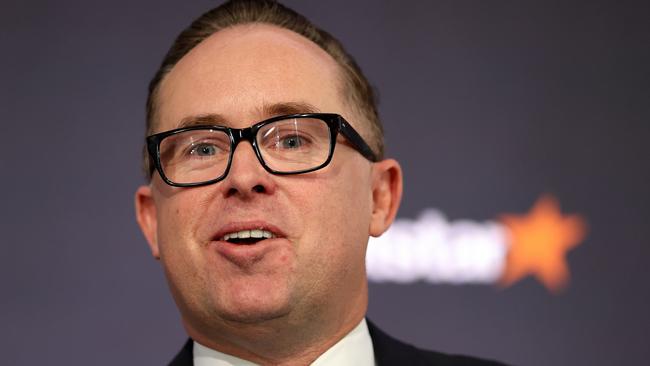Qantas says more flights on time as it placates irate customers
But publicly available figures show only about 60 per cent of flights arriving and departing Sydney last week were on time.

Qantas says it has recorded a significant turnaround in its performance in the last month, with 70 per cent of flights landing on time in the last week of August.
The airline has been under significant pressure after a disastrous run following the lifting of pandemic restrictions, with chief executive Alan Joyce forced to apologise and provide incentives to placate irate customers.
New figures released by Qantas show an increase in on-time performance, from just 47 per cent in July, a record low for the airline.
At the same time, the company says its cancellation rate has improved from 7.5 per cent in June to 2.2 per cent, and the rate of misplaced bags went from 12 in 1000 in April, to six in 1000 last month.
While official on-time performance data is not due to be released until later this month, analysis of publicly available data compiled by The Australian shows about 64 per cent of flights arriving and departing from Sydney were on time.
The worst day was August 29, when fewer than 50 per cent of flights were on time, but by Friday more than 70 per cent of services operated to schedule in Sydney.
Mr Joyce said Qantas had a target of 75 per cent on-time performance in September, and was expected to return to pre-pandemic operating levels, 80 per cent, in October.
“This does depend on some factors out of our control, like extreme weather events or air traffic control, but the operation will be a lot more robust overall,” he said.
Separately, a report from corporate and government travel advisory Butler Caroye shows Qantas fares remain significantly above those of its competitors, Rex and Virgin Australia.
Average Qantas economy fares rose from $246 to $258 between March and June, the data shows, while Virgin fares rose from $158 to $178 in the same period.
Butler Caroye managing director Tony O’Connor said the findings were based on hundreds of thousands of corporate bookings to determine how the air travel market was developing post-Covid.
“We wanted to see if it was ripe for healthy competition, or if we’re heading for a market dominated by one big player,” Mr O’Connor said.
“The result is pretty good – it shows that pricing and services are ready set go for competition.”

Among the key findings was an actual drop in airfares compared to 2019 prices, with Qantas economy fares down 16 per cent, and Virgin Australia tickets 25 per cent cheaper.
Mr O’Connor said the average Qantas economy fare on capital city routes for corporate travellers was $258, while it was $178 at Virgin Australia and $189 at Rex.
“The gap between Qantas and Virgin economy class fares on capital city routes seems to have settled at over 30 per cent. Overall Rex fares sit roughly in the middle,” Mr O’Connor said.
The difference was much more pronounced in business class, with Qantas charging 56 per cent more than Virgin for passengers sitting at the front of the plane.
Across all capital city routes, a Qantas business fare cost an average of $1218, while Virgin Australia charged $542.
On the Melbourne-Sydney route, Qantas charged $790 for a business class seat and Virgin Australia $338.
In terms of flight frequency, the report noted that Qantas had the edge over Virgin Australia with up to 30 flights a day projected for Melbourne-Sydney in October, five more than Virgin.
Rex was expected to operate six return flights a day on the route next month, up from five currently.
Mr O’Connor said businesses looked closely at airfares when booking travel, but price was not the only consideration.
“For 95 per cent of business travellers who fly economy, their companies are looking to do three things – manage risk, reduce carbon and reduce costs,” he said.
“Sustainability is now an assessment criteria in nearly all travel tenders, but savings are still king.”








To join the conversation, please log in. Don't have an account? Register
Join the conversation, you are commenting as Logout